Study Abroad
Santiago de Compostela, Spain

Our first dinner reservation in the Historic Town of Santiago
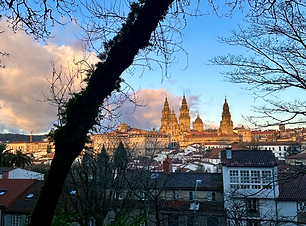
My view of the cathedral in my walk to class in the morning.
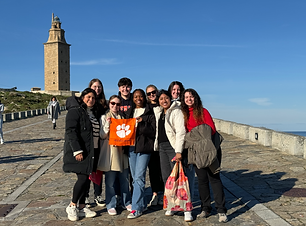
Our group trip to A Coruña to see the Tower of Hercules (in the background).
In the spring of 2024, I was accepted into Clemson’s study abroad program in Santiago de Compostela, Spain. I spent four transformative months studying at the University of Santiago de Compostela and living with a local host family. Our program was made up of just nine Clemson students, and we were one of only two American groups in the entire university. Looking back, I’m immensely grateful for the connections I made, the opportunities for cultural exploration, and the perspective-broadening experiences I had. Studying abroad in Spain helped me grow as a student and individual through cultural immersion, academic challenges, and meaningful relationships with locals.
Probably the most nerve-racking part of the experience for me was the idea of living with a host family. I had heard horror stories from friends about awkward and even unpleasant placements, so I was unsure of what to expect. However, my worries quickly disappeared when I met Uxia, my host mom, who picked me up late at night with contagious enthusiasm, excited to tell me all about Santiago’s landmarks and history. She lived with her two high school-aged children, Iria and Gael, and their small dog, Sammie, in a quiet, family-friendly neighborhood about a 45-minute walk from the university. From day one, they welcomed me into their home and lives, and I genuinely felt like a part of their family and community.
Living with Uxia gave me a unique chance to experience Galician culture in an intimate and everyday way. She prepared homemade meals rooted in tradition, like tortilla and octopus, and every evening around 8 or 9 p.m., we sat down together as a family to eat and talk. Sometimes, other relatives or neighbors joined, adding to the lively atmosphere. We’d discuss our days and local politics or simply watch the news together and react to current events. These nightly conversations were incredible for practicing spontaneous Spanish and helped me gain confidence in expressing myself in real-time.
By the end of the semester, my spoken Spanish had improved dramatically—so much so that Iria and Gael commented on how much clearer and more natural I sounded at dinner. Their honesty meant a lot to me, as only high schoolers can provide. The experience of living in someone else’s home, adapting to their routines, and being embraced by their kindness helped me grow not just linguistically but personally. I became more confident, adaptable, and open-minded, and I credit much of that growth to the support and patience my host family showed me every single day.
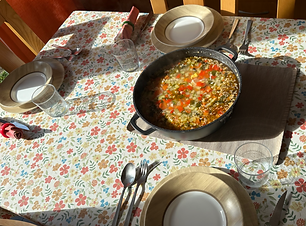
On sunny days the family and I would enjoy lunch with the windows open to the gar
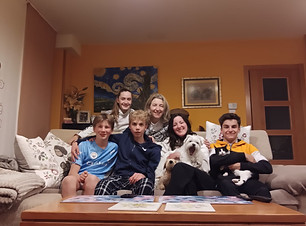
Photo of my host family and I
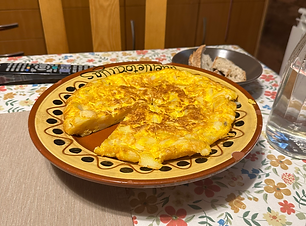
Uxía would make her own version of the Spanish tortilla some nights.
Academically, I took a range of courses that deepened my understanding of the Spanish language and culture. Each weekday started with an intense Spanish grammar and writing class, which challenged me to improve my professional writing and communication skills. I also took a rotating “Spanish Topics” class that introduced us to Galician culture, the healthcare system in Spain, and business practices. On Thursdays, we attended a film class that focused on Spanish cinema through the lens of female directors, which gave me a new perspective on both history and storytelling. Though our classes were mostly separate from local students, all our professors were part of the university, and they brought personal insight and depth to each topic.
There were some big differences between academic life in Spain and what I was used to at Clemson. The most surprising one was how integrated relaxation was into the school day. Between classes, we always had a 30-minute break to grab something from the campus café—often seeing students casually drinking a beer or smoking before their next lecture. The separation between school and personal life felt more distinct there, and it made me reflect on how cultural attitudes around work and balance shape the academic experience.

Churros and hot chocolate during our break between classes
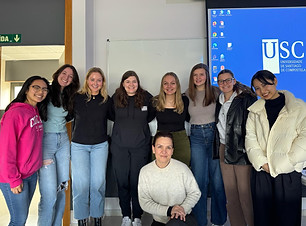
Photo of our class with our professor Rocio
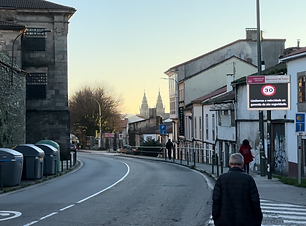
My walk to class in the morning from my host family's home
Outside of school, our program offered countless opportunities to participate in cultural activities across Galicia and beyond. One of the most memorable was Carnival in February, which reminded me of Halloween back home. Our group dressed in animal onesies and took a bus with other international and local students to a small Galician town where the whole community celebrated with music, costumes, and a giant parade. Santiago also hosted its own parade with colorful floats from different schools and clubs. I was really impressed by the Easter celebrations, where the city’s spiritual roots were on full display with processions, traditional dress, and statues of religious figures carried through the streets. Later that semester, I traveled to Seville and experienced the Fierria festival—watching the archway lights turn on at midnight and dancing through tents was an experience I’ll never forget.
One of the best parts of studying abroad was the connections I made with local students. Through a buddy program at the university, we were each paired with Spanish students who helped us navigate the culture and gave us someone to practice speaking with. It was such a rewarding and unique opportunity to form friendships across cultures. These relationships helped me gain insight into daily Spanish life, student experiences, and the perspectives of people my own age who grew up in a very different environment.
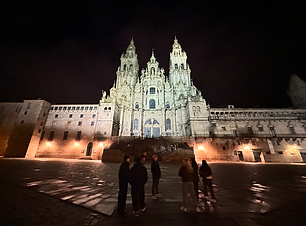
Us visiting the cathedral at night

Our trip to Carnival including our costumes
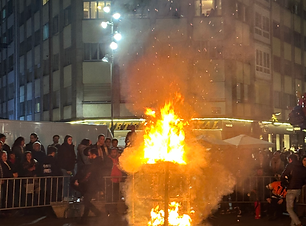
A Santiago Carnival tradition where they burn a large wooden pig in the town squa
One weekend, we had the opportunity to walk a portion of the Camino de Santiago, one of the most famous pilgrimage routes in the world. Unfortunately for us, the weather was not on our side—it rained heavily and was bitterly cold. Despite that, we managed to find joy in the experience, stopping at historical sites like Roman ruins, medieval castles, and ancient churches. We even toured a massive monastery and spoke with some of the priests. The weekend became a bonding moment for many of us. As we walked through the rain and cold, taking in the breathtaking landscape, we shared deep conversations about our futures, goals, and dreams after college.

Roman ruins we encountered
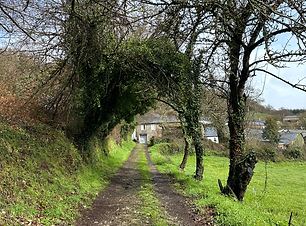
One of the paths we took through villages on the camino
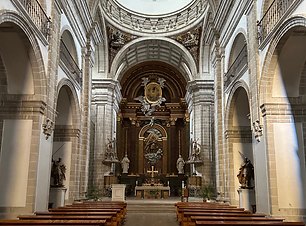
Inside the monistary we recieved a tour of
Throughout the semester, I was also lucky enough to travel around the Iberian Peninsula, visiting major cities and small towns in both Spain and Portugal. I explored Madrid, Barcelona, Vigo, A Coruña, Sevilla, and Tenerife in Spain. In Portugal, I visited Braga, Porto, Aveiro, Coimbra, Sintra, and Lisbon. Each place taught me something new. Living in Galicia, which shares more cultural and linguistic ties with Portugal than the rest of Spain, really opened my eyes to the regional diversity and political dynamics of the Iberian Peninsula. The most impactful moment of these travels was when I decided to go on a solo trip. Being alone in a foreign country forced me to adapt quickly and trust myself more deeply, building confidence I hadn’t realized I was missing.

My first Barcelona football game!
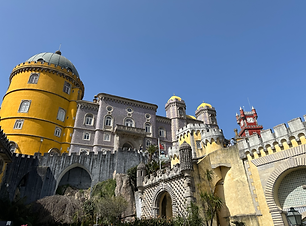
The Peña Palace in Sintra, Portuga
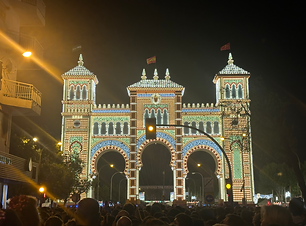
The Fierria lights in Seville which turn on at midnight before the festival
Reflecting on all the experiences I had while abroad, one of the most eye-opening aspects of Spanish culture was the emphasis on community and a slower, more intentional life. I found that, especially through my experience living with a host family and interning at a local hotel, things like meals not being rushed and conversations expanding far past their original topic were common. Unlike my experience growing up in the U.S., where a productivity and work centered mindset was favored, what I found in Spain is that there was greater emphasis on presence and enjoyment in everyday routines. Even the overall structure of the day was very prevalent in Galicia, where lunch is the biggest meal, shops close for siesta, and many things were generally closed on Sunday. The day-to-day rhythm was something very different however it forced me to reconsider my own understanding of time and productivity.
Another reflection experience is an element of Spain’s history that I didn’t know much about before living there. Through my conversations with Uxía, professors, and other locals, I began to understand how Franco’s dictatorship still shapes regional and national identity. How, especially in Galicia, learning their language Gallego was against the law and many had to speak it in secret. This added complexity to my understanding of Spain, it’s a country shaped not just by its unique food, art and music, and festivals, but as a country still healing from deep historical tragedies. And now, Galician’s open celebration of their language and traditions shows the importance of taking pride in your heritage and to not take it for granted. This gave me a more significant understanding of Spain’s history and the strength of its people.
Overall, my time abroad changed me for the better. I returned to the U.S. with a new worldview, stronger confidence, and a clearer sense of the kind of life I want to live. I had always wondered what it would be like to live and work abroad, and this experience gave me a realistic yet hopeful understanding of what that life entails. While I now understand the challenges of adapting to a new culture, I also feel more equipped and excited to take them on. If given the opportunity to live or work abroad again, I would absolutely take it—with my Santiago experience to guide me.